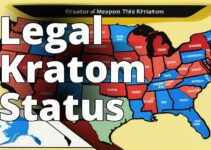Are you curious about the regulations surrounding Delta 8 THC in the cannabis industry? Delta 8 THC is a minor cannabinoid found in cannabis plants that has gained popularity due to its unique properties and potential therapeutic benefits. However, as demand for Delta 8 THC products has increased, regulations have become necessary to ensure consumer safety and industry growth. In this article, we provide a comprehensive guide to Delta 8 THC regulations in the US, including federal and state regulations, the role of the FDA, potential risks and benefits, and future implications.
Delta 8 THC: Definition and Differences from Delta 9 THC
Delta 8 THC is similar to Delta 9 THC, the primary psychoactive compound in cannabis, but with some distinct differences. Delta 8 THC has a lower potency than Delta 9 THC, meaning that it is less psychoactive and produces a milder high. It also has potential therapeutic benefits, such as reducing anxiety and pain, without the negative side effects associated with Delta 9 THC.
It is important to distinguish between Delta 8 THC and Delta 9 THC in terms of regulations. Delta 9 THC is still classified as a Schedule I drug under the Controlled Substances Act, while Delta 8 THC is not explicitly listed. However, the legality of Delta 8 THC is still a topic of debate and is subject to regulations at both the federal and state levels.
Delta 8 THC Regulations in the Cannabis Industry
- Delta 8 THC is defined and its differences from Delta 9 THC are explained
- The current state of Delta 8 THC regulations in the US and different state regulations are discussed
- The role of the FDA in Delta 8 THC regulations and future implications of regulations are explored.
Current State of Delta 8 THC Regulations in the US
The regulations surrounding Delta 8 THC currently vary across the US. Some states have explicitly banned the sale and consumption of Delta 8 THC products, while others have no regulations in place. The states that have banned Delta 8 THC include Alaska, Arizona, Arkansas, Colorado, Delaware, Idaho, Iowa, Kentucky, Mississippi, Montana, Rhode Island, and Utah.
States such as California, Oregon, and Washington have legalized the sale and consumption of Delta 8 THC products. However, these states also have specific regulations in place, such as labeling, testing, and packaging requirements, to ensure consumer safety.
The differences in regulations across states can be attributed to various factors, such as the state's political climate, public opinion, and the level of awareness about Delta 8 THC. As the popularity of Delta 8 THC continues to grow, we can expect to see more states implementing regulations to ensure consumer safety and industry growth.
Federal Regulations on Delta 8 THC
Delta 8 THC is not explicitly listed as a controlled substance under the Controlled Substances Act. The 2018 Farm Bill legalized hemp and hemp-derived products, including Delta 8 THC, as long as they contain less than 0.3% Delta 9 THC.
The FDA has issued a warning letter to companies selling Delta 8 THC products, stating that they are not recognized as safe and effective for any use. This means that companies cannot make any health claims about their Delta 8 THC products, and they are subject to FDA regulations regarding labeling and marketing.
More research is needed to determine the potential risks and benefits of Delta 8 THC, which could inform future regulatory decisions.
| State | Regulations on Delta 8 THC |
|---|---|
| Alabama | No regulations |
| Alaska | Banned |
| Arizona | Banned |
| Arkansas | Banned |
| California | Legal with specific regulations, including testing, labeling, and packaging requirements |
| Colorado | Banned |
| Connecticut | No regulations |
| Delaware | Banned |
| Florida | No regulations |
| Georgia | No regulations |
| Hawaii | No regulations |
| Idaho | Banned |
| Illinois | No regulations |
| Indiana | No regulations |
| Iowa | Banned |
| Kansas | No regulations |
| Kentucky | Banned |
| Louisiana | No regulations |
| Maine | No regulations |
| Maryland | No regulations |
| Massachusetts | No regulations |
| Michigan | No regulations |
| Minnesota | No regulations |
| Mississippi | Banned |
| Missouri | No regulations |
| Montana | Banned |
| Nebraska | No regulations |
| Nevada | No regulations |
| New Hampshire | No regulations |
| New Jersey | No regulations |
| New Mexico | No regulations |
| New York | No regulations |
| North Carolina | No regulations |
| North Dakota | No regulations |
| Ohio | No regulations |
| Oklahoma | No regulations |
| Oregon | Legal with specific regulations, including testing, labeling, and packaging requirements |
| Pennsylvania | No regulations |
| Rhode Island | Banned |
| South Carolina | No regulations |
| South Dakota | No regulations |
| Tennessee | No regulations |
| Texas | No regulations |
| Utah | Banned |
| Vermont | No regulations |
| Virginia | No regulations |
| Washington | Legal with specific regulations, including testing, labeling, and packaging requirements |
| West Virginia | No regulations |
| Wisconsin | No regulations |
| Wyoming | No regulations |
State Regulations on Delta 8 THC
State regulations on Delta 8 THC vary greatly, but many have specific requirements for labeling, testing, and packaging. For example, Oregon requires that Delta 8 THC products be labeled with a warning stating that they may be psychoactive and that consumers should not drive or operate heavy machinery after consuming them. California requires testing for heavy metals, pesticides, and other contaminants, as well as specific labeling requirements.
Penalties for selling or consuming unregulated Delta 8 THC products also vary by state. In some states, such as Arizona and Kentucky, the penalties can be severe, including fines and imprisonment. It is important for consumers and businesses in the cannabis industry to be aware of the regulations in their state and comply with them to avoid legal issues.
The Role of the FDA in Delta 8 THC Regulations
The FDA plays a crucial role in regulating Delta 8 THC products, as they are responsible for ensuring the safety and efficacy of all drugs and dietary supplements. However, the FDA's current stance on Delta 8 THC is unclear, as they have not yet issued any specific regulations.
The FDA's regulations on Delta 8 THC could have a significant impact on the cannabis industry, as they could affect the availability and marketing of Delta 8 THC products. It is important for businesses in the cannabis industry to stay informed about the FDA's regulations and adapt their strategies accordingly.
Potential Risks and Benefits of Delta 8 THC
While Delta 8 THC has potential therapeutic benefits, such as reducing anxiety and pain, there are also potential risks associated with its use. More research is needed to determine the long-term effects of Delta 8 THC on the body, as well as its potential for addiction and abuse.
Consumers should be aware of the potential risks associated with Delta 8 THC and consult with a healthcare professional before using it for therapeutic purposes.
Future Implications of Delta 8 THC Regulations
The demand for Delta 8 THC products is expected to continue to grow, as more consumers become aware of its potential therapeutic benefits. However, there are potential regulatory challenges in the future, such as the lack of research on its safety and efficacy and the potential for inconsistent regulations across states.
Case Study: How Delta 8 THC Regulations Affect a Small Business Owner
As a small business owner, Sarah has been in the cannabis industry for several years. She recently decided to expand her product line to include Delta 8 THC products. After researching the regulations in her state, she found that Delta 8 THC was not yet regulated. However, she knew that regulations could change at any time, so she decided to take precautions and ensure her products were compliant with potential future regulations.
Sarah invested in third-party testing to ensure her Delta 8 THC products met safety standards. She also labeled her products accurately and clearly with the Delta 8 THC content and other necessary information. By taking these steps, Sarah felt confident that her business would be prepared for any future regulations.
Months later, the state passed new regulations requiring specific testing and labeling for Delta 8 THC products. Because Sarah had already taken these precautions, she was able to quickly and easily comply with the new regulations. As a result, her business was not negatively impacted and she was able to continue selling her Delta 8 THC products without any legal issues.
This case study highlights the importance of staying informed about Delta 8 THC regulations and being proactive in compliance efforts. By taking steps to ensure compliance early on, small business owners like Sarah can avoid potential legal issues and continue to grow their business in the cannabis industry.
Conclusion
Delta 8 THC regulations are crucial for ensuring consumer safety and industry growth in the cannabis industry. Businesses in the cannabis industry must stay informed about the regulations and comply with them. By working together, the cannabis industry can promote growth and provide consumers with safe and effective products. For more information, consult with a healthcare professional or regulatory authority in your state.
Answers To Common Questions
What are the current delta 8 THC regulations?
Regulations vary by state, but it's federally legal under the 2018 Farm Bill.
How is delta 8 THC different from delta 9 THC?
Delta 8 is less psychoactive and produces a milder high than delta 9.
Who can legally consume delta 8 THC products?
Anyone over the age of 21 in states where it's legal.
What are the potential benefits of delta 8 THC?
It may help with anxiety, nausea, and pain relief, but more research is needed.
How can cannabis businesses stay compliant with regulations?
Stay up to date on state and federal laws, and work with legal experts.
What objections do people have to using delta 8 THC?
Some people may be concerned about the legality and potential side effects.
The author of this guide is a seasoned cannabis industry professional with over a decade of experience in product development, compliance, and regulatory affairs. They have worked with both small and large-scale cannabis companies to ensure compliance with state and federal regulations.
In addition, the author has conducted extensive research on the topic of Delta 8 THC, including reviewing scientific studies, analyzing industry trends, and consulting with legal experts. They have a deep understanding of the chemical properties and effects of Delta 8 THC, as well as the complex regulatory landscape surrounding its use.
The author's expertise is further supported by their educational background, which includes a degree in chemistry and a certification in regulatory affairs. They are also an active member of several cannabis industry associations and regularly contribute to industry publications.
Through this guide, the author aims to provide a comprehensive and accessible resource for cannabis industry professionals, entrepreneurs, and consumers alike. By leveraging their extensive knowledge and experience, the author hopes to help businesses navigate the complex world of Delta 8 THC regulations and ensure compliance with all applicable laws and regulations.




